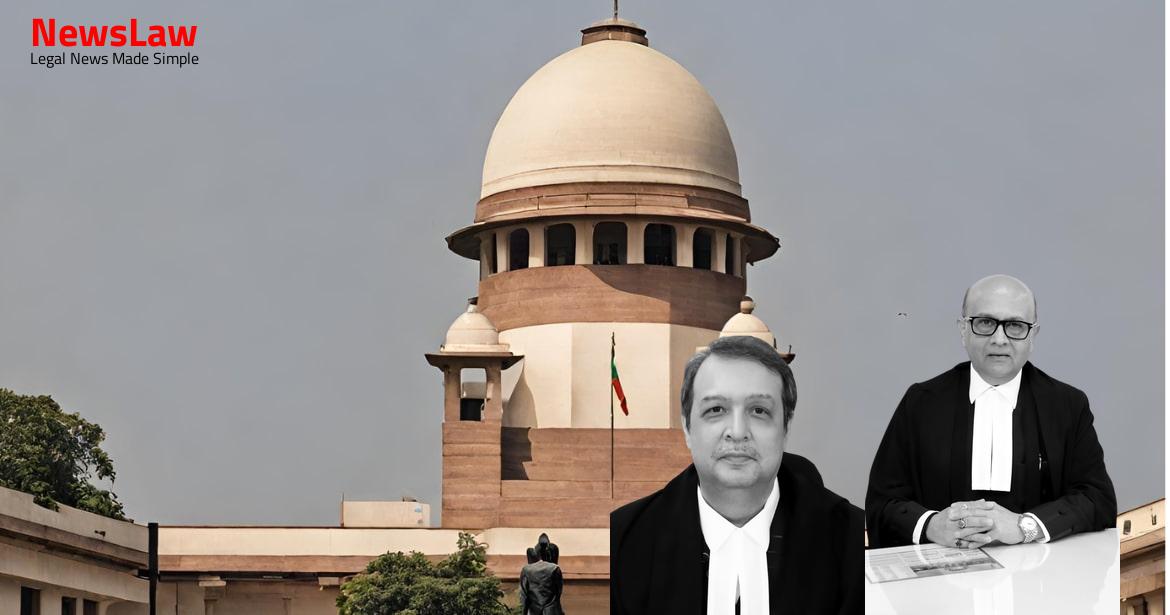In a significant legal development, the Supreme Court of India has issued a judgement regarding the dissolution of marriage settlement between Ruchi Agarwal and Amit Kumar Agrawal. The case involves complex issues surrounding matrimonial relations and settlement agreements. Stay tuned to learn more about the court’s decision and its implications on similar cases.
Facts
- The transfer petition seeking transfer of the petition filed by the respondent-husband under Section 9 of the Hindu Marriage Act from Varanasi to Pune was restored to its original number and forwarded to the Supreme Court Mediation Centre.
- The parties reached a settlement facilitated by the Mediator, where the respondent-husband agreed to pay a total of Rs. 1 Crore 15 lakhs as alimony to the petitioner-wife.
- As per the settlement agreement, the respondent-husband paid Rs. 50 lakhs to the petitioner-wife and agreed to pay the remaining amount in two installments – Rs. 50 lakhs by 31.08.2024 and Rs. 15 lakhs by 31.12.2024.
- The petitioner-wife was also supposed to collect her gold, jewelry, and silver items from the respondent-husband as part of the settlement terms.
- Despite the clear undertaking and agreement, the petitioner-wife seemed to have resiled from the settlement agreement during the court hearing.
Also Read: Supreme Court Quashes Reduction in Pay Scale Decision and Recovery Order in Bihar Govt. vs. XYZ
Arguments
- Petitioner-wife’s counsel confirmed that she has stopped instructing him in the matter.
- Respondent-husband has withdrawn the matrimonial case as per the settlement terms.
- Petitioner-wife is alleged to have taken advantage of the settlement executed before the Mediator.
- Appellant’s counsel argues the settlement was obtained under threat and coercion, denying receipt of lump sum maintenance and stridhan properties.
- Petitioner-wife accepted Rs. 50 lakhs as part payment of permanent alimony but is now trying to back out of the settlement.
- Respondent-husband’s counsel asserts his client will abide by remaining terms of settlement and make due payments if the marriage is dissolved.
- Petitioner-wife’s conduct is deemed recalcitrant for disregarding the settlement terms agreed upon in the mediation proceedings.
- Respondent-husband has been disadvantaged due to Petitioner-wife’s actions, having withdrawn the case and paid a significant portion of the permanent alimony.
- The High Court’s order regarding ARG (Ruchi Agarwal) is being challenged in this appeal.
- The specific points of the High Court order in question have not been provided in the given context.
- The case of Ruchi Agarwal v. Amit Kumar Agrawal was cited as a similar situation in the current case.
Also Read: Acquittal of Accused Appellants in Mohmedfaruk @ Palak Safibhai Memon Case
Analysis
- The appellant initially admitted receiving stridhan and maintenance in a lump sum and agreed to no future maintenance.
- Later, she withdrew the compromise petition due to alleged non-payment of the agreed amount.
- A divorce by mutual consent was granted under Section 13-B of the Hindu Marriage Act based on the parties’ statement in court.
- The compromise deed involved withdrawal of all civil and criminal cases against each other, including the complaint under Sections 498-A, 323, and 506 IPC and under Sections 3 and 4 of the Dowry Prohibition Act.
- The appellant filed a divorce petition after withdrawing the compromise petition, seeking a divorce and refuting receipt of the agreed amount.
- The appellant undertook to withdraw all proceedings, civil and criminal, initiated against the respondents, including the complaint under various sections.
- The appellant obtained a divorce and withdrew a Criminal Case under Section 125 of the Criminal Procedure Code based on the compromise agreement.
- Though the High Court partially allowed to quash the complaint, the appellant proceeded with the appeal without withdrawing the complaint.
- The Court quashes the criminal proceedings arising from the case filed under Sections 498-A, 323, 506 IPC, and Sections 3 and 4 of the Dowry Prohibition Act against the respondents.
- The compromise deed resulted in the husband giving the wife a consent divorce, fulfilling his part of the obligation under the compromise.
- The appellant partially performed her obligations by withdrawing her criminal complaint under Section 125 CrPC.
- Despite initial claims of coercion, the appellant ultimately affirmed the terms of the compromise in court, which led to the proceedings being dropped and a divorce being obtained.
- The Court views the appellant’s conduct as indicative of filing the criminal complaint to harass the respondents, especially after receiving the desired relief through the compromise.
Also Read: Judgment by the Supreme Court Of India: Board of Directors vs Charged Officer
Decision
- Matrimonial relations between the spouses irreparably broken
- No possibility of reconciliation
- Granting of divorce under Article 142 of the Constitution of India
- Marriage between the petitioner and the respondent dissolved
- Clear directive for the remaining settlement payment
Case Title: TRISHA SINGH Vs. ANURAG KUMAR (2024 INSC 450)
Case Number: T.P.(C) No.-001008 – 2023



